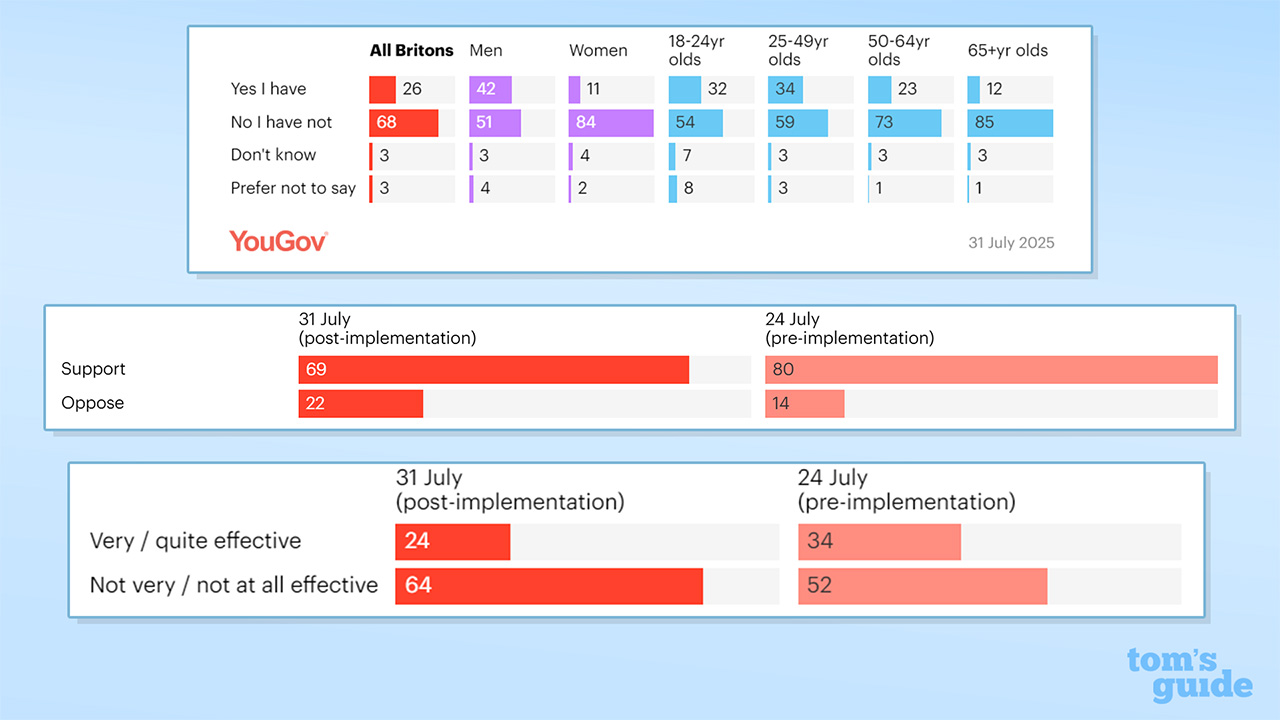An extra 5 million age checks a day are being completed thanks to the UK’s Online Safety Act

New data suggests there has been an additional five million age verification checks every day in the UK since the introduction of the Online Safety Act.
Sites hosting content deemed harmful for under 18s must now verify the age of visitors. But many see this as a significant privacy and cybersecurity risk – and have turned to the best VPNs in an attempt to bypass the checks.
The Online Safety Act has triggered an important discussion about online privacy and there are strong views from both supporters and critics of the law.
Those backing the law, including the UK government, have said it’s doing a vital job at protecting children online. However, the law’s opponents have said it comes with significant cybersecurity risks and compromises online privacy. One cybersecurity expert called it a “disaster waiting to happen.”
5 million more checks a day
According to the Age Verification Providers Association (AVPA) there has been a significant increase in daily age verification checks online.
As reported in the Guardian, the AVPA’s Executive Director, Iain Corby said: “As a result of new codes under the Online Safety Act coming into force on Friday, we have seen an additional five million age checks on a daily basis, as UK-based internet users seek to access sites that are age-restricted.”
How can your age be checked?
- Photo ID
- Email address
- Credit card / bank details
- Mobile network information
- Facial age estimation
The AVPA said it couldn’t share a baseline comparison to this figure, but some sites introduced age verification checks before the Online Safety Act became law.
Reddit, X, and Spotify are just some of the sites you might have to verify your age to access all its content. But there have also been reports of overreach and content not traditionally seen as harmful being blocked.
The UK government said “platforms should not arbitrarily block or remove content and instead must take a risk-based, proportionate approach to child safety duties.”
It went on to say “the act is not designed to censor political debate and does not require platforms to age gate any content other than those which present the most serious risks to children.”
However research by the BBC found that reports on the conflicts in Gaza and Ukraine have been blocked as a result of the Online Safety Act.
The government stands firm
There has been vocal opposition to the law and a petition demanding the UK government repeals the act is approaching 500,000 signatures.
The UK government has said it wouldn’t repeal the act, adding that it is “working closely with Ofcom to implement the Act as quickly and effectively as possible to enable UK users to benefit from its protections.”
“Proportionality is a core principle of the act and is in-built into its duties,” the UK government said. “As regulator for the online safety regime, OFCOM must consider the size and risk level of different types and kinds of services when recommending steps providers can take to comply with requirements.”
MP Peter Kyle, Secretary of State for Science, Innovation and Technology, is one of the law’s biggest supporters.
He said the law “marks the most significant step forward in child safety since the internet was created” and that “age verification keeps children safe.”
However Kyle has also made controversial comments towards opponents of the law and in a tweet said you “are on the side of predators” if you wanted to overturn the Online Safety Act.
The law has received support from an array of children’s charities and YouGov research found that 69% of Britons are in favor of age verification checks.
However, this is down from the 80% support recorded prior to the law’s introduction and only 26% had encountered age checks online. Furthermore, 64% said it would be “not very / not at all effective” in preventing under 18s from accessing harmful content.

Online privacy and security is still a concern
Regardless of the positives, and the well intentioned nature of the law, there are fundamental privacy and cybersecurity concerns that need to be addressed.
People don’t feel comfortable handing over sensitive personal information to third-party age check providers such as AgeGO, Persona, and Yoti.
Each provider has a different approach to data security, with some deleting it straight away and others holding it for some period of time. Any data being stored is at risk of a breach and the impact of one could be catastrophic.
The recent Tea app breach exposed the ID of thousands of women in the US – an age verification provider breach could be even worse.
Major VPN providers surged up the UK Apple App Store charts as people looked for ways to avoid age verification checks. Suspect free VPNs also rose in popularity and put people’s data at risk in different ways.
These privacy and cybersecurity concerns must be appropriately addressed, and not cast aside, should the UK government want the Online Safety Act to succeed in the best way it can.
We test and review VPN services in the context of legal recreational uses. For example: 1. Accessing a service from another country (subject to the terms and conditions of that service). 2. Protecting your online security and strengthening your online privacy when abroad. We do not support or condone the illegal or malicious use of VPN services. Consuming pirated content that is paid-for is neither endorsed nor approved by Future Publishing.
Source link

